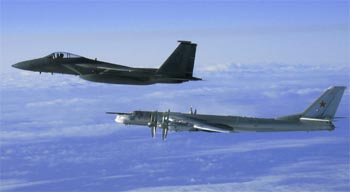 |
International Affairs
Sarah Palin: Alaska as Foreign
Policy Experience
Toby Westerman
Alaskan Governor Sarah Palin is criticized for a lack of foreign policy experience. Overlooked, so far, is consideration of Alaska's geopolitical position: 50 miles from the increasingly aggressive Russian Federation.

A Russian TU-95 being intercepted by an American fighter off the coast of Alaska |
Palin is the chief executive of the U.S. State on the front line in what some describe as a new Cold War.
The list of threats against Palin's State are serious and growing. Russian economic interests are attempting to gain control of the construction of a gas transit line from Alaska to the "lower 48." More seriously, Russian cruise missile-capable bombers are probing Alaskan coastal defenses, and Alaska's Arctic coast is becoming part of a confrontation with Russia over the region's considerable natural resources.
While not primarily responsible for the external protection of her State, Palin is, nevertheless, accountable for the safety of a population targeted by Moscow for intimidation - or worse.
The most obvious, and ominous, threat to Alaskans comes from Russian aircraft operating off the Pacific coast of Alaska. Since 2007, TU-95 bombers, referred to as "Bear" bombers by U.S. and NATO military leaders, are testing U.S. defenses. Although relatively slow, the TU-95 is capable of carrying cruise missiles that could cause a sudden and disastrous attack on Alaskan cities and oil facilities.
U.S. Secretary Condoleezza Rice has condemned the Bear bomber flights as a "very dangerous game."
There is speculation that the Russian bomber flights are in partial response to U.S. recognition of the independence of Kosovo, which is claimed by Serbia as a province. Moscow supports Serbia and bitterly denounces U.S. and Western support for Kosovo independence.
Like most Americans, Palin knows that the Arctic ice is melting, but as Alaska's governor, she also knows that the opening of once-blocked shipping lanes also exposes the vast wealth lying under the Arctic Ocean to an international race for riches.
And this race has military implications.
Vast reserves of oil and natural gas, as well as gold, diamonds and nickel, are thought to lie under what was once the frozen Arctic Ocean. America's claim to this bonanza of natural resources lies with Alaska and the shelf extending from the coast into the Arctic Ocean.

Gov. Palin constantly supported the US military |
Five nations are in a race to support their claims to the region: Russia, the United States, Canada, Norway and Denmark.
Russia has already dispatched a submarine to plant the Russian flag under the North Pole to support and extend its regional claims.
The northern coast of Alaska is on the front line of America's attempt to protect its rights and interests. The Coast Guard has begun to examine the role it can play in the region. As a new Northwest Passage is opening for international shipping, the Coast Guard will have the responsibility of conducting search and rescue off the Alaskan coast, and of asserting U.S. presence in the region.
As the Coast Guard considers the range of its duties, the U.S. Army is preparing to act, if necessary, to protect U.S. rights in the Arctic. Five thousand U.S. troops have recently concluded a 12-day military exercise, Northern Edge 2008, to ready American forces for action in the north Alaskan-Arctic region. Russian and Canadian forces are making similar military preparations. As tensions grow, Alaska is again on the front line.
As Moscow flexes its muscle from the Alaskan coastline to the mountains of post-Soviet Georgia, some among the Russian political elite are beginning to demand the return of Alaska to Russia. Many in Russia believe that the 1867 sale of Alaska to the United States exploited the Tsar's need at the time for money. There is still a Russian cultural presence in Alaska, and some of the Moscow elite appear tempted to place Alaska in the Russian "sphere of influence."
Although official Russian policy has not, as yet, sought to reclaim Alaska, the demand among some members of the Russian elite for control of America's 49th state indicates the increasing pressure which Alaskans are facing.
Unlike any other State in the United States, Alaska - and its governor - are aware of the threats the nation now faces.
The President of the United States is responsible for the national security of the nation, but Governor Palin, as chief executive of a State under Moscow's steely gaze, realizes that America faces a very serious foreign threat, and her understanding comes from direct experience with the Russian bear.

Posted September 10, 2008
Toby Westerman publishes
International News Analysis - Today
An investigative, analytical, and uncompromising weekly analysis of the world situation
Contact T. Westerman at
www.inatoday.com
or P.O. BOX 5182, Rockford, ILL, 61125-0182

Related Topics of Interest
 Card. Oddi: Vatican II Was the Revolution in the Church Card. Oddi: Vatican II Was the Revolution in the Church
 The Progressivist Challenge to Fatima The Progressivist Challenge to Fatima
 Our Lady of Fatima and the Third Secret Our Lady of Fatima and the Third Secret
 Moscow: Past is Present Moscow: Past is Present
 Russia to Nuke Neighbors? Russia to Nuke Neighbors?
 Conversion of Russia Negated by Vatican Conversion of Russia Negated by Vatican
 Moscow Warns of a “Looming War of Civilizations” Moscow Warns of a “Looming War of Civilizations”
 The Closest Thing Possible to Stalinism The Closest Thing Possible to Stalinism

 
|
International Affairs | Hot Topics | Home | Books | CDs | Search | Contact Us | Donate

© 2002- Tradition in Action, Inc. All Rights
Reserved
|
 |
|